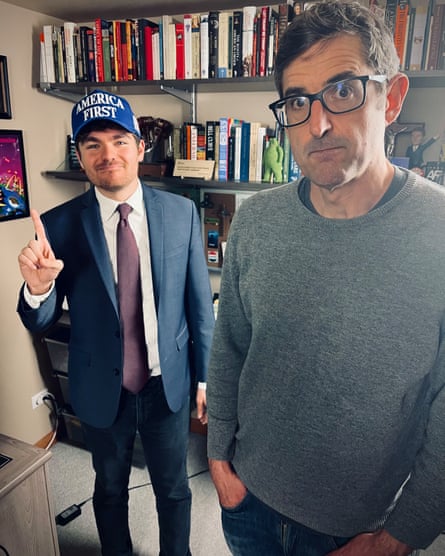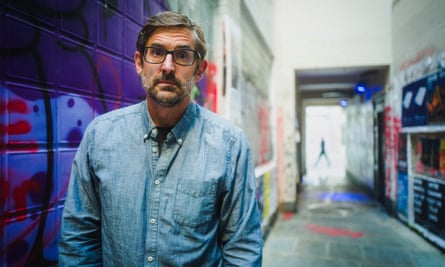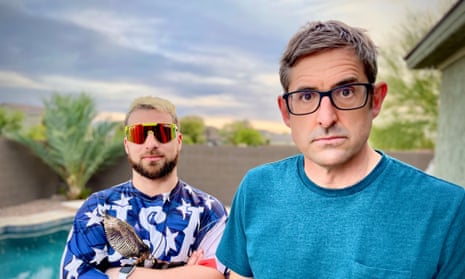In 25 years of presenting documentaries, I’ve made it something of a specialty to go to places and listen to people whose views represent something troubling, even dangerous. The first segment I ever made on TV, for Michael Moore’s TV Nation, was about millennial cults and involved a trip to western Montana, where I spoke to two neo-Nazis in a trailer. For several hours, they explained how some time in the not-too-distant future there would be global racial conflict, leading to Jesus Christ returning and banishing the different races to separate planets in some cosmic version of old-school southern segregationist policies. Late in the evening, when it had grown dark outside, they made me a cup of tea, which I appreciated. They seemed a little warmer towards me and I asked whether, after the inevitable race war, I might be able to make occasional visits to the black people’s planets, but it was still a non-starter.
In the years since, I’ve made many more hours of documentaries on a variety of subjects, some of them focused on more innocent kinds of cultural oddity, such as infomercial gurus or swingers’ parties; others on more serious social themes of crime and mental health. But there has always been a strand in my work of being curious about the side of life deemed – in that rather woolly pejorative buzzword – “problematic”.
On Sunday, I have a new series going out on BBC Two. Louis Theroux’s Forbidden America is squarely in the sweet spot of problematic content. White nationalists, trigger-happy rappers and figures in the porn world accused of sexual misconduct – they all make appearances. In one sense, in the context of my output, it is business as usual – my latest stop-off in a journey that started all those years ago with neo-Nazis in Montana. But in another sense, in releasing this series now, I am aware that it is business as unusual. Times have changed. The world is different; the pandemic, social media, the killing of George Floyd and the ensuing conversations about institutional prejudice and Black Lives Matter. In the context of everything that’s happened in the last couple of years, the decision to put out a series chockful of troubling individuals giving expression to upsetting and extreme opinions might seem odd.
The term is “platforming”: the idea that it is irresponsible to amplify hateful voices and that in doing so one is contributing to their power and their harm. We should instead ignore the toxic and the dangerously misinformed, the argument goes: exclude them from the conversation. At its simplest, this is a view so uncontroversial as to be almost banal. Quite clearly, we don’t want card-carrying neo-Nazis hosting daytime quiz formats or giving talks to children at our local schools. There is no obligation for us to hear paedophile apologists or Isis sympathisers on Radio 4’s A Point of View. Nor to give air time to flat-earthers or climate crisis deniers on current affairs shows.

This has been the case for as long as the media have existed: broadcasters have always had an obligation to think about ways in which they reflect opinions that may be misinformed or hateful. Making it even more pressing nowadays is the demonstrable harm caused by the spread of false information online and the way this has empowered formerly marginal figures such as conspiracy theorists and nativists. The world we were delivered by Mark Zuckerberg, instead of the promised one in which we would connect with friends via Facebook and share pictures of banana bread, has curdled into a more troubling place where trolls, anti-vaxxers, ethnonationalists and conspiracy loons can pipe their nonsense directly on to our laptops and phones.
Dodgy algorithms have weaponised our anger and fear, enticing us into liking and sharing content that is false and divisive. And in a manner reminiscent of the fast-food industry, and its reliance on high-fat, high-sugar content, we appear powerless to resist the spread of junk information about lizard overlords, Pizzagate, and what Phoebe Cates looks like now and how it will leave you speechless (answer: she looks fine).
In this new landscape, every day seems to bring a new test case of whether some influencer or high-profile person should be deplatformed, or whether tech companies and media outlets are throttling free expression by deciding what we can and can’t see and hear. Donald Trump fomented unrest on Twitter and was kicked off. The comedian Dave Chappelle sparked boycotts and a campaign by trans rights activists for jokes on a comedy special on Netflix. As I write, the papers are reporting a growing groundswell against Spotify for its deal with the US podcast host Joe Rogan. Musical artists Neil Young and Joni Mitchell have taken their music off the streaming platform, saying they don’t wish to be part of a service that – in their view – contributes to vaccine misinformation.
These aren’t always easy situations to figure out and each of them needs careful thought. The bigger point, though, is that I do understand how, viewed in this context, my decision to put some potentially dangerous and inflammatory figures on BBC Two primetime might appear flat-out weird and irresponsible. And to be clear, some of the people who feature in the documentaries are several orders of magnitude beyond Rogan and Chappelle on the “cancelometer”. Extreme and Online, the first episode of Forbidden America, is about a community of trolls and white nationalists whose mascot and leader, the diminutive streamer and broadcaster Nick Fuentes, tells me at one point it would be better if women didn’t have the vote. He says he views homosexuality as “disgusting”. He has also made Holocaust-denying remarks in his online broadcasts. He was outside the Capitol on 6 January and is on record as praising the events of the day, viewing them as a blow for freedom and justice.
Other interviewees in the show are cut from similar cloth. A far-right hipster-influencer who calls himself Beardson Beardly, and has appeared online in images doing what many believe to be Nazi salutes (though he denies this), gets some airtime – before he throws me out of his house for asking him about the salutes. Another person I speak to is a troll and livestreamer who uses the pseudonym Baked Alaska (his real name is Anthime Gionet), who has posted inflammatory racist content online – getting himself kicked off Twitter– and was inside the US Capitol building on 6 January, livestreaming his own act of alleged trespass and soliciting several thousand dollars’ worth of donations as he did so. So no – they wouldn’t be your first choices to fill in for Sue Perkins and Gyles Brandreth on Just a Minute.
And yet I believe I was right to make a programme about them. There are several reasons why. The most obvious one is the nature of the project. I make immersive documentaries, researching, shooting and editing over the course of months or even years. It is very far from the “here’s your mic, have at it” atmosphere of a conventional debate or TV appearance. Over the years I have made programmes in prisons, among confessed murderers and paedophiles, and in maximum security hospitals for paedophiles.
These troubled, sometimes dangerous people are legitimate subjects of journalistic inquiry. You wouldn’t have them sitting in as pundits on The Moral Maze but in the right context, with the right approach, speaking to people who have done terrible things can be a totally valid exercise: revealing and ultimately life-affirming, shining a light on aspects of human psychology and society in a way that promotes understanding and cultivates empathy.
You might argue that an inmate or convicted predator is a different case from someone actively promoting a divisive political position. And there’s something in that. But – without wishing to sound too much like Liam Neeson – I have a specific set of skills that means I believe I can be trusted to tell these stories in a responsible way. By being informed, by doing the research, by spending time in the field – for hours or days or weeks even – questioning, challenging and revealing the reality of the people we are reporting on, and doing responsible journalism.

“But why do we need to hear from these people?” you may ask. Well, you might not need to. But the reason you might choose to is because of what their existence says about the world we are living in, and because of the very real power they represent. The truth is, in terms of his online following, Nick Fuentes and his ilk already have platforms from which they can and do reach audiences, in bedrooms and living rooms around the world, in the millions. And just as Trump has shown no sign of disappearing – notwithstanding his cancellation from virtually every social media outlet going – the reach of Fuentes and his supporters is not likely to end soon. So the choice we are faced with is whether to be curious about that phenomenon, try to figure out why it’s growing, what it’s feeding on, how it can be challenged, or whether to ignore it and hope it goes away.
Incidentally, so far, I’ve only written about the first episode, Extreme and Online. In other episodes we meet rappers in Florida who appear to enjoy stoking beefs that have cost lives and getting tattoos on their eyelids that say “Fuck you”; and we interview the porn agent Derek Hay, who has been accused by some former models of sexual misconduct but who has denied any wrongdoing.
Part of the job of telling these stories has been working hard to reveal the layers underneath. Over the more than two years we’ve spent making it, enormous effort has gone into giving the programme the necessary shape and context to ensure that questionable views are interrogated, conveying to viewers the whole story and not just those parts the interview subjects wish to show. One positive side-effect of the new media landscape is that it’s harder for people to hide their real views. In having their own platforms, the participants in these worlds have not only acquired new influence, they have also created vast digital catalogues freely available online and filled with candid expressions of their sincere opinions, for all of which they can be held accountable.
This brought an enjoyable transparency to the filming and a sometimes edgy and even hostile energy: the sense of it being a showdown between a legacy media emissary and an insurgent force of disrupters. In several meetings with the far right, they had their own cameras trained on me. Baked Alaska implied he might be making a documentary about me. On several occasions, the far-right influencers did broadcasts about me when I wasn’t around, making clear their real feelings, including one in which Nick Fuentes described me as “pretentious” (moi!?) and ridiculed what he took to be my view of him as a hatemonger, characterising it as either dishonest or – in his word – “retarded”. But the bigger point is that, for all their intricacy and ironical pirouetting around the subject of their real beliefs, their digital footprints meant I had the advantage of being informed as to who I was really dealing with.
I understand why some may question my decision to bring figures such as Fuentes to the attention of a wider mainstream public. Grappling with these subjects over the past two years hasn’t always been easy. We started researching in 2019 and were about to start filming in March 2020 when Covid hit. Now here we are, two years on in a culture whose increasing virtuality and virality shows no sign of ending. But for all the challenges we faced, and the difficulties of facing up to content that is upsetting at times, I’d also like to think the job is important and worthwhile, and that the difficulties involved are, among other things, a testament to the timeliness and weight of the subjects.
They are powerful and troubling programmes. But I’m proud of how they turned out. Just like the new digital landscape the films reflect, their darkness also presented me with new possibilities for reaching people. The old world, with its heirloom newspapers and broadcasters monopolising debate, is gone. Now we face a chorus of maverick voices – some hateful, some benign, all of them disruptive, and no longer confined to trailers in Montana.
Louis Theroux’s Forbidden America starts on Sunday 13 February at 9pm on BBC Two and iPlayer.
